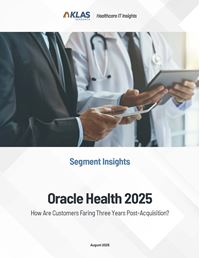

Oracle Health (Cerner) 2023
Customer Perceptions of Oracle Health
Cerner, one of the major software vendors in healthcare IT, has gone through significant changes over the last year and a half. In October 2021, they announced a new CEO and introduced RevElate as their go-forward patient accounting platform. Two months later, Oracle announced their intent to acquire Cerner. Customers soon reached out to KLAS, wanting to know about their peers’ experiences with these changes. To gather this information, KLAS has been meeting regularly with leaders from over 20 healthcare organizations. This report shares their transition experience and how it has impacted their confidence in Cerner—now Oracle Health—as their go-forward partner. Customer insights come from three rounds of interviews:
- Round 1—March 2022: Customers’ initial thoughts on company changes
- Round 2—July 2022: Customers’ perceptions after Oracle Health finalized acquisition of Cerner and announced company vision
- Round 3—November 2022: Customers’ impressions after Oracle Cerner Health Conference (OCHC)
Note: For more customer feedback about recent company changes, read the Cerner Flash Insights report and the Cerner Soarian Financials Pulse Check report.
Growing Number of Respondents Question Oracle Health as a Long-Term Partner Due to Lack of Tangible Results & Road Map
In March 2022, respondents were generally more optimistic about Oracle Health being a long-term partner. That optimism has dropped over the course of the year, and in November, about one-fourth of respondents reported they no longer see the vendor as a viable long-term partner. Large organizations (1,000+ beds) most commonly switched opinions; many who were previously on the fence now report that Oracle Health is no longer part of their long-term plans, saying there has been very little meaningful communication about RevElate (more details below) and that they can’t keep waiting for the vendor to deliver. Regardless of size, respondents attribute their decreased confidence to several concerns, such as the unspecific road map, undelivered improvements, and possible price increases under Oracle Health. Additionally, respondents wonder how Oracle Health will have sufficient resources to successfully implement RevElate across the customer base, since the vendor is seen as lacking the required expertise and resources in this area (the result of extensive layoffs).
Customers would like Oracle Health to deliver on past promises (e.g., around revenue cycle and the physician experience), saying this would increase their confidence in the vendor’s ability to deliver on future promises. Among those who report Oracle Health is part of their long-term plans, few are without reservations. Several will continue as customers because of existing contracts or because the cost of switching vendors is too high. Nearly all say Oracle Health needs to improve their delivery and share a detailed road map for future development.
“We are on the fence about Cerner being our long-term partner because they are sending mixed messages even though the vendor is saying all of the right things at their user group meetings. The vendor is talking about revamping the EHR’s back end and RevElate for the cloud, but they are also laying off tons of employees. For me, those things don’t equate. Ultimately, Cerner needs to start pushing out some codes and driving actual results with their products.” —VP/executive (undecided about Oracle Health as a long-term partner as of November 2022)


Most Customers Lack Confidence in Oracle Health’s Ability to Execute on Their Vision for the Future
Oracle Health has shared a high-level vision for the future that aligns with organizations’ needs. However, most respondents express concerns about the vendor’s ability to deliver. A top concern is the lack of details in Oracle Health’s plans, which respondents say the vendor has poorly conveyed; as a result, customers are unclear about what will be developed and when those things will be delivered. Even customers who are confident in the vision (those who gave 8 and 9 ratings on a 1–9 scale) point to the vendor’s lack of a clear plan as an opportunity for improvement. Still, these respondents are more optimistic about Oracle Health’s ability to execute than Cerner’s. Those who are unconfident worry about the ongoing leadership changes and the executives’ ability to make improvements, especially since vendor representatives can’t always describe to customers what direction the company is headed in. Further, customers are concerned that Oracle Health’s focus on their vision will detract them from addressing lingering, unresolved issues and fulfilling promises regarding enhanced functionality.


“I am not confident because Oracle is remaining silent. To boost our confidence, we would need a software development road map. We want to know where they are going and what they are going to work on. They talk about RevElate but not where they are going with it. There are issues with scheduling and EHR functionality, but we don’t know what they are going to be bringing to market and fixing over the next year.” —CIO at <1,000 bed organization (sees Oracle Health as a long-term partner as of November 2022)
Customer Insights on RevElate
Respondents Express Concerns about RevElate’s Delivery
Over the years, Cerner customers—regardless of which revenue cycle product they use—have had difficulties with their product. The different product iterations have generally not met their expectations, and after more than 20 years of customers feeling Cerner hasn’t consistently delivered a successful product, many are slow to believe things will be different with RevElate. Ever since the platform was introduced in October 2021, most respondents (across all three rounds of interviews) have seen only screenshots of the software and have never viewed the system in a live environment, and some go so far as to call the product vaporware. For respondents to increase their confidence in Oracle Health delivering RevElate, they want to see the system in a live environment and speak directly with beta users about their user experience. Additionally, in November 2022, 10 of the 24 respondents mention one or both of the following: (1) Oracle, as the acquiring company, doesn’t have enough expertise, and (2) the experienced Cerner resources who could help ensure product success are no longer with the company.
Of the three November 2022 respondents who are confident or very confident Oracle Health will successfully deliver RevElate, one notes the product is already live at a couple of sites, and another appreciates the direct communication between their organization and Oracle Health (though the customer still notes Cerner’s history of not delivering). The third respondent is confident but admits the solution’s promised capabilities that haven’t yet materialized will soon be surpassed by other options in the market. Respondents who feel neutral about RevElate don’t know enough details to determine their outlook. Those who are unconfident or very unconfident cite the lack of tangible results as the driving factor.

Despite Gaining Better Understanding of RevElate, Customers Are Dissatisfied with Communication, Have Reservations and Unanswered Questions
Most November 2022 respondents feel they have a better understanding of RevElate than they did 12 months ago when the product was first introduced. However, 84% are dissatisfied with Oracle Health’s communication around RevElate. Much of the RevElate communication has consisted of high-level marketing materials that respondents don’t find helpful, and those who attended the recent OCHC mention that the speakers didn’t focus much on revenue cycle topics or products. Only 1 of the 17 respondents who attended OCHC says the event boosted their confidence in RevElate. One customer believes Oracle Health has become distracted since the acquisition, saying the vendor must get more settled before being able to focus on RevElate.
Respondents still have many unanswered questions, like when they will be able to learn about beta testers’ experience and how RevElate will impact their organization and revenue cycle processes. Several respondents state that their increased understanding is a result of talking with their peers, not from efforts made by the vendor. Three say their greater understanding is thanks to increased executive involvement, including face-to-face meetings that outline product specifications and timelines. Of the four respondents whose understanding of RevElate has greatly improved, only one says they are confident in Oracle Health’s ability to successfully deliver the product; they also note that Oracle Health’s time frames are unrealistic and that the vendor’s staffing problems must be addressed before RevElate can be delivered in a way that meets customer expectations.
“There is absolute confusion behind RevElate. There has not been a clear plan of what RevElate will look like and what the needs and approach are going to be. We have asked the vendor for months now to give us a better perspective on what RevElate is from a financial perspective and in terms of a strategic initiative, and we still have not been able to get that. In essence, it seems like they are still trying to map out RevElate, and it is a little more progressed than vaporware at this point.” —CIO at 1,000+ bed organization (does not see Oracle Health as a long-term partner as of November 2022)




About This Report
This study is composed of findings gathered from three rounds of interviews with Oracle Health (Cerner) customers; interviews occurred in March 2022, July 2022, and November 2022. This report—which primarily focuses on insights from the November 2022 interviews—shares customer perceptions of Oracle Health and respondents’ experience ever since Cerner announced big company changes in 2021. To gather these perspectives, KLAS used a supplemental evaluation to interview leaders from 24–26 customer organizations (although KLAS made every effort to interview the same organizations across all three rounds of interviews, the number of respondents sometimes varied).
Respondents were asked the following questions:
- Do you see Cerner as a long-term partner?
- Are you more or less confident in Oracle Health now that their purchase of Cerner has been finalized?
- If you attended 0CHC, did the communication there meet your needs/expectations?
- If you didn’t attend OCHC, has the vendor’s communication over the past three months met your needs/expectations?
- How would you rate your confidence in Oracle Health’s overall vision for the future?
- How confident are you that Oracle Health will successfully deliver RevElate?
- How has your understanding of RevElate changed in the past 12 months ago?
- If you attended OCHC, did you gain more confidence in RevElate after the event?
- How would you rate Oracle Health’s communication around RevElate?
- What are the two most critical things you would bring up to Oracle Health?

Writer
Sarah Brown

Designer
Breanne Hunter

Project Manager
Andrew Wright
This material is copyrighted. Any organization gaining unauthorized access to this report will be liable to compensate KLAS for the full retail price. Please see the KLAS DATA USE POLICY for information regarding use of this report. © 2026 KLAS Research, LLC. All Rights Reserved. NOTE: Performance scores may change significantly when including newly interviewed provider organizations, especially when added to a smaller sample size like in emerging markets with a small number of live clients. The findings presented are not meant to be conclusive data for an entire client base.








